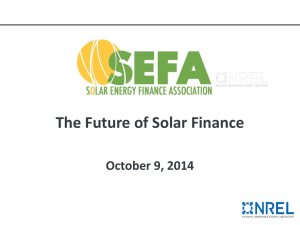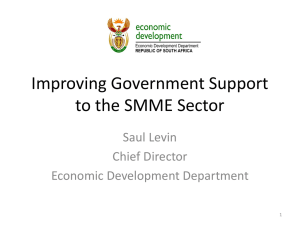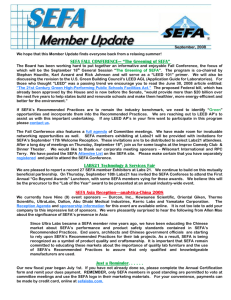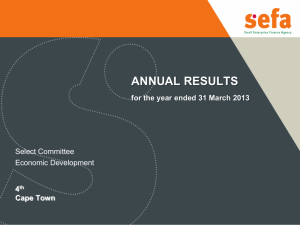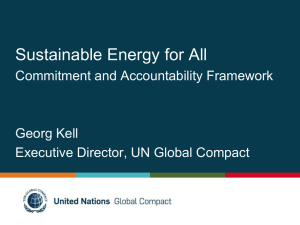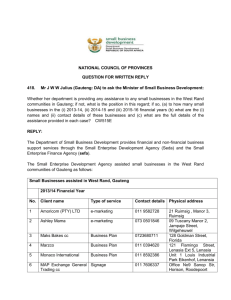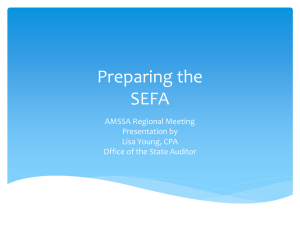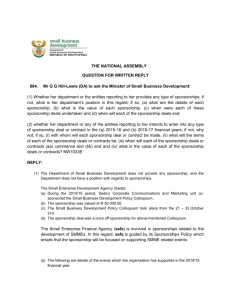(SMMEs) to Access
advertisement
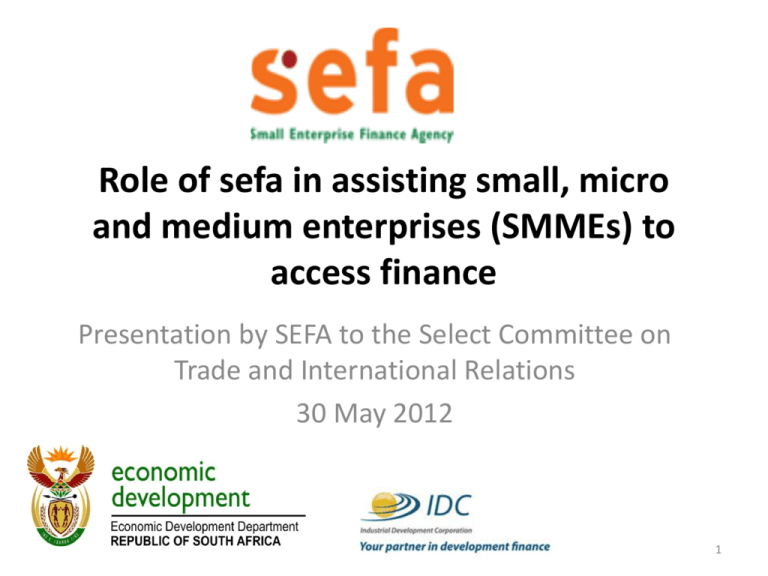
Role of sefa in assisting small, micro and medium enterprises (SMMEs) to access finance Presentation by SEFA to the Select Committee on Trade and International Relations 30 May 2012 1 OUTLINE • • • • • • • • • • • • • Overview and Background Corporate form sefa Board of Directors sefa developmental outcome Mandate and Vision Mission and Values Strategic Objectives Products and Services Delivery model What’s different in the delivery model Footprint & Access Points Performance targets Current provincial footprint 2 OVERVIEW AND BACKGROUND • The merger of Khula, the South African Micro Finance Apex Fund (samaf) and the Industrial Development Corporation (IDC) small business funding portfolio was initially mentioned in the New Growth Path and later announced by the President in the State of the Nation Address in February 2011; leading to the establishment and launch of The Small Enterprise Finance Agency (sefa) in April 2012. • The purpose of sefa is to respond to the challenge of access to finance for start-up and expansion by small businesses. sefa will do this by providing and facilitating access to finance for sustainale small business, and ultimately contributing to economic development and employment creation. • sefa services are targeted to Survivalist, Micro, Small and Medium Enterprises (SMMEs) in South Africa. 3 SEFA BOARD The following sefa Board Members were appointed by the Minister with effect from 1 April 2012: • • • • • • • • • • Ms SM Rensburg (Chairman), Mr M Ferreira, Mr IAS Tayob, Ms HN Lupuwana, Mr SA Molepo, Mr VG Mutshekwane, Ms BP Calvin, Mr GS Gouws, Ms K Schumann, Mr LB Mavundla. 4 CORPORATE FORM • • • • • • Shareholder compact Policy Engagement Establishment of a new wholly owned subsidiary of the IDC combining Khula, SAMAF and IDC’s Small Business function IDC Shareholder agreement To be established in terms of the IDC Act Shareholder agreement to be signed between the subsidiary Board and the IDC Shareholder compact between IDC and EDD incorporates the activities of the entity To be managed as a subsidiary in respect of accountability, fiduciary responsibility, etc. Independent sefa board appointed EDD • Policy Engagement between EDD & dti and IDC & sefa Board sefa IDC Small Business activities IDC SB portfolio / activities migrates (absorbs Khula ) RFI’s (capacity building and wholesale lending) Loan Guarantees with banks Direct lending Joint ventures Migrate to Khula Samaf MFIs (Capacity building and wholesale lending) Co-ops (Capacity building and wholesale lending) Other government initiatives with whom to explore relationships National Empowerment Fund Business Support Services (pre loan approval) in partnership with SEDA Postbank Sefa developmental outcome • The objective of sefa is to contribute to the establishment, survival and growth of SMMEs. • Through the provision of access to finance sefa aims to positively impact on OUTCOME 4, i.e decent employment through inclusive economic growth as per government’s outcomes delivery agreement. 6 Mandate and Vision • sefa’s strategic objectives are a response to the organisational mandate, vision and mission as follows: – Legislative Mandate Derived from IDC Act 3(d) to foster the development of Small and Medium enterprises and cooperatives – Vision • To be the leading financier for development of sustainable Survivalist, Micro, Small and Medium enterprises. 7 Mission Our mission seeks to: • To provide finance to Survivalist, Micro, Small and Medium sized enterprises (SMMEs) throughout South Africa on a wholesale and direct basis • To provide credit guarantees to financial intermediaries that lend to Small, Medium and Micro businesses • Support the capacity development of Financial Intermediaries. • To support SMMEs with post investment support • To create strategic partnerships for sustainable SMMEs development and support. • To monitor the effectiveness and impact of finance provision, credit guarantees and capacity development in the Survivalist, Micro, Small and Medium sized enterprise sector • To develop innovative finance products, tools and channels to catalyse increased market participation in the provision of affordable finance to Survivalist, Micro, Small and Medium sized enterprises. 8 Values sefa’s guiding principles for decisions and activities and behaviour are: 1. Speed and urgency: (kuya sheshwa!!!) 2. Passion for development (solution driven attitude, commitment to serve ) 3. Integrity: (Dealing with clients and stakeholders in an honest and ethical manner). 4. Transparency: (Ensuring compliance with best practice on the dissemination and sharing of information with all stakeholders). 5. Innovative: (continuously looking at new and better ways to serving our customers) 9 Sefa’s strategy will be underpinned by four (4) key pillars: 1. Appropriate and affordable products and services that are cost effective 2. Continuous research, learning and innovation 3. An effective highly performing organisation with passion for development 4. An appropriate structure, infrastructure and process throughout South Africa to drive organisational performance 10 Strategic Objective 1 Increase access and provision of finance to Survivalist, Micro, Small and Medium Enterprises Goal statement 1: Increase the utilisation of guarantee indemnity scheme by commercial banks Goal statement 2: Expand partnerships with microfinance institutions Goal statement 3: Expand partnerships with retail finance institutions Goal statement 4: Scale-up direct lending to Micro, Small and Medium Enterprises 11 Strategic Objective 2 Build a fit for purpose institution that is sustainable and responsive to the needs of target market Goal statement 1: Complete the integration of staff and systems of the relevant organisations to create an effective sefa Goal Statement 2: Build efficient and effective business processes, systems and infrastructure Goals statement 3: Develop and implement a dynamic human capital, values and culture aligned to the sefa’s mandate Goal statement 4: Develop appropriate, cost effective and affordable products and service 12 Strategic Objective 3 Build a learning organisation Goal statement 1: Design and implement a dynamic research and development capacity Goal statement 2: Develop performance-based monitoring and evaluation systems and processes Goal statement 3: Design and implement an organisation-wide knowledge management system 13 Strategic Objective 4 Develop and implement a national footprint for effective product and service delivery. Goal statement 1: Ensure representation of sefa in each of the nine provinces Goal statement 2: Implement effective marketing and communication to relevant stakeholders 14 Strategic Objective 5 Build a sefa that meets all legislative, regulatory and good governance requirements Goal statement 1: Implement approved strategic plan Goal statement 2: Ensure effective board and management with clear roles and responsibilities are in place Goal statement 3: Design and implement all governance structures for effective reporting 15 Product and Services • The products and services offered by sefa include: Wholesale Products • Business loans • Funds/JVs • Non-financial support e.g. capacity building and post-loan support • Institutional Indemnities Retail Products • Commercial debt – Revolving loans • Guarantees –Performance guarantees – Bridging finance –Supplier guarantees – Term loans –Loan payment facility guarantees – Asset finance, and – Short-term trade finance 16 Delivery model • It is proposed that the Survivalists and Micro Enterprises be exclusively serviced through the wholesale model and the Small and Medium Enterprises through a hybrid of a wholesale and retail business model. SURVIVALIST MICRO SMALL R3 million R50 000 WHOLESALE LENDING MEDIUM WHOLESALE LENDING THROUGH BANKS AND RFIs RETAIL LENDING Serviced indirectly through FSCs and MFIs. • Serviced directly through retail lending and indirectly through specialist financing partners The pricing strategy will be such that there is a discount to market rates generally available to these enterprises but should adequately cover operating costs, exposure to losses, economic fluctuations and generate sufficient margin to be largely self sustaining. In addition the development objectives will be taken into consideration. 17 What’s different in the delivery model Wholesale lending • partner with stronger financial intermediaries operating in sector specific/niche markets • seek intermediaries that share sefa’s developmental objectives • limit interest rate charged by intermediaries to end-beneficiaries • build a network of stronger intermediaries through targeted capacity building interventions aimed at creating sustainable SMMEs • leverage sefa systems and processes to build the branch network • develop targeted programmes to support key government policies and targeted sectors 18 What’s different in the delivery model Retail lending • provide finance directly to viable SMMEs that cannot otherwise attract private sector funding • deliver simplified products • faster turnaround times • leverage infrastructure of existing and potential partners (eg IDC, seda, Post Bank, provincial economic development institutions, etc) • promote financial literacy amongst SMMEs through various partnerships • provide post loan support to funded SMMEs • use flexible approach to traditional credit scoring methods (cash flow based and viability of the business) 19 Footprint • • The retail network consisting of regional; branch; and satellite offices will span across the nine provinces and all districts of South Africa In order to be efficient as well as effective: a “one stop shop” concept has been developed where Branch Offices and/or Satellite Offices will be established on the premises of sister organisations or other DFIs or local government agencies or other local development agencies. Sefa Head Office (Gauteng, Tshwane -Centurion) Eastern Cape (East London) Districts Free State (Bloemfontein) Districts Gauteng (Johannesburg) Districts Kwazulu Natal (Durban) Districts Limpopo ( Polokwane ) Districts Mpumalanga (Nelspruit) Districts North Cape (Kimberly) Districts North West (Rustenburg) Districts Western Cape (Cape Town) Districts 20 Performance targets for SEFA For the period 2013 – SME Finance Micro Finance 2017 Wholesale Wholesale Loans to loans to intermediaries intermediaries SME Retail – Small SME Retail – Medium Credit Indemnity Approvals R600 million R1 billion R1.2 billion R1.1 billion R360 million by banks No of new loans issued directly - - 5000 350 - R250 000 R3 million R300 000 Ave SMME loan size R250 000 (by R4 500 (by intermediaries) intermediaries) No of SMME's financed through intermediaries 3000 180 000 - - 1200 No of jobs created 12 000 - 14 000 12 000 8 400 21 Current provincial footprint 22 No. of financing partners Access points to sefa products and services ___________________________ Disbursements (R’000) Disbursements for the period ended 31 March 2012 ___________________________ THANK YOU 25
